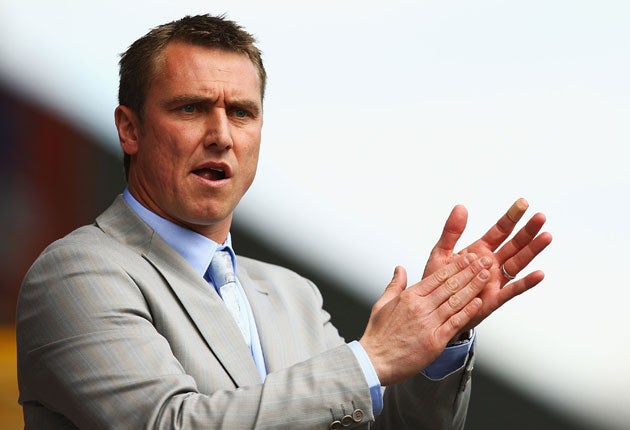Clark's a bad loser, just like Wenger – and old Herbert
Spirit of Thirties is revived as young Huddersfield manager shares opposite number's fear of failure

"Arsenal Football Club is open to receive applications for the position of team manager. He must be fully experienced and possess the highest qualifications for the post both as to ability and personal character. Gentlemen whose sole ability to build up a good side depends on the payment of heavy and exorbitant transfer fees need not apply."
It was an advertisement that might have attracted Arsène Wenger. Instead it brought Herbert Chapman to Highbury to forge what Wenger said was "the common history" between Arsenal and Huddersfield Town. Arsenal recruited Chapman, the first recognisable football manager who selected, trained and bought his players, because they did not want to pay big fees. But they were not above paying big wages; his salary of £2,000 a year was the equivalent of £377,000 in today's terms. He was worth it.
Today marks the first meeting of the clubs in the FA Cup since Chapman's death in January 1934 as he was attempting to win a third championship with Arsenal to add to the two he had seized at Huddersfield.
The two teams walked out together for the 1930 final, a tradition that has endured since; that was Chapman's idea. Before kick-off he brought a gramophone into the Arsenal dressing room to calm the players down. He had floodlights installed at Highbury, though Arsenal were not allowed to play under them.
He pioneered European trips and tried to buy European footballers until he was blocked by the Football Association. He perfected a strategy for signing young players by being friendly to their families, something Sir Alex Ferguson would turn into an artform. He converted the position of centre-half from an attacking to a defensive player. "The Napoleon of Football" the papers called him.
Before big games, Chapman would take his Huddersfield players off to Blackpool to prepare. His distant successor, Lee Clark, will be making no special preparations for the League One side's encounter with Arsenal at the Emirates Stadium today.
"It's my toughest challenge but I wouldn't say it's my biggest," he said in the deep accent of the North-east, a region that after a catastrophic third round has no representatives left in the competition. "Our biggest challenge is to get this club out of this division and into the Championship.
"But it is my toughest task and the most exciting because of where we're going and who we are up against and who my opposite number is this weekend. The style that Arsenal play is what I aspire towards. My dream as a manager is to have a team full of young footballers, playing like that."
Huddersfield's chairman, Dean Hoyle, is the type that Abu Dhabi oil money and American leveraged buy-outs have driven from the Premier League. A local boy made very good, who has dreams for his home-town club. When Hoyle, who sold his greetings card business The Card Factory for around £350m, brought Clark to the beautiful, futuristic sweep of the Galpharm Stadium two years ago, he admitted it was a risk. "It is a gamble as he has no track record as a manager," Hoyle said at the time.
Clark (pictured) was 36 and it says something for the long afterglow of Kevin Keegan's Newcastle teams that Clark's image is still that of the football-daft Geordie who played midfield with a big grin. At the 1999 FA Cup final he turned up in a T-shirt ridiculing Sunderland supporters, which would have been funny had he not been playing for the club.
Peter Reid, his then manager, was forced to fire him, although the two have remained good friends. Earlier this month, Reid sat in Clark's small office at the Galpharm discussing Huddersfield's 3-2 victory over his Plymouth side, part of a string of results that has taken them to the edge of the automatic promotion places.
The image is wrong, as images often are. Clark is deeply serious about football and was 23 when he took his first coaching badge. His win record of 50 per cent is the same as Chapman's but both lag behind Cecil Potter and Ambrose Langley, forgotten men who succeeded and preceded Chapman at Huddersfield. "I wanted to be a manager. I didn't want to be a coach. I wanted to take the big decisions," he said in the kind of language Chapman would have understood.
Soon after taking the job, Clark took himself off to the Emirates to attend a seminar at which another manager who can be very unlike his public image was speaking. Wenger has an acidic temper and as a young manager he would sometimes be physically sick after a defeat. He told Clark he would not want to be working in the lower leagues where defeats are so frequent.
"I remember it word for word," said Clark. "I keep going back to the conversation I had with Arsène at the seminar. Everything he said has stuck in my mind. I can relate to what he said about losing. I am not a bad loser in that I always congratulate the opposition and shake hands, but I hate it. It hurts." And there was no pain quite like losing an FA Cup semi-final, as he had when his Fulham side faced Chelsea in 2002. "I cannot imagine anything quite like it."
Arsenal v Huddersfield Town is on ESPN today, kick-off 12pm
Join our commenting forum
Join thought-provoking conversations, follow other Independent readers and see their replies
Comments
Bookmark popover
Removed from bookmarks